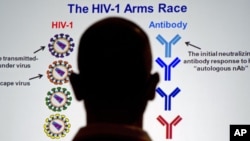New appeals are going out to ramp up support for women and children in the fight against AIDS.
The streets of Ghana are among the many front lines in the battle against HIV - the virus that causes AIDS.
Health care centers there do testing and provide other services to prevent the spread of the deadly disease.
But in Washington D.C. at the International AIDS Conference, Dr. Chewe Luo with the United Nations Children's Fund (UNICEF), said it is not enough to focus on adults.
"We have to, and we must, focus on adolescents and make sure that adolescents have access to high-impact interventions," said Luo.
Luo said too many of the treatment programs are ignoring teenagers - a group at high risk for contracting HIV. And she warned, without more support for teens, efforts to protect mothers and children from infections will not be able to keep up.
"If we don't protect the second decade of life, all that investment will yield nothing," Luo said.
But new help for women may soon be on the way.
Dr. Carl Dieffenbach with the U.S. National Institutes of Health announced Tuesday the start of a new study on a vaginal ring to give women longer-term protection.
"Because this product is designed to be replaced once a month, it offers potential to increase the chances that women will continually use the product as opposed to a product that has to be applied in a behaviorally dependent prior to sex way or on a daily basis," he said.
About 3,500 African women have signed up to take part in the study.
The streets of Ghana are among the many front lines in the battle against HIV - the virus that causes AIDS.
Health care centers there do testing and provide other services to prevent the spread of the deadly disease.
But in Washington D.C. at the International AIDS Conference, Dr. Chewe Luo with the United Nations Children's Fund (UNICEF), said it is not enough to focus on adults.
"We have to, and we must, focus on adolescents and make sure that adolescents have access to high-impact interventions," said Luo.
Luo said too many of the treatment programs are ignoring teenagers - a group at high risk for contracting HIV. And she warned, without more support for teens, efforts to protect mothers and children from infections will not be able to keep up.
"If we don't protect the second decade of life, all that investment will yield nothing," Luo said.
But new help for women may soon be on the way.
Dr. Carl Dieffenbach with the U.S. National Institutes of Health announced Tuesday the start of a new study on a vaginal ring to give women longer-term protection.
"Because this product is designed to be replaced once a month, it offers potential to increase the chances that women will continually use the product as opposed to a product that has to be applied in a behaviorally dependent prior to sex way or on a daily basis," he said.
About 3,500 African women have signed up to take part in the study.




